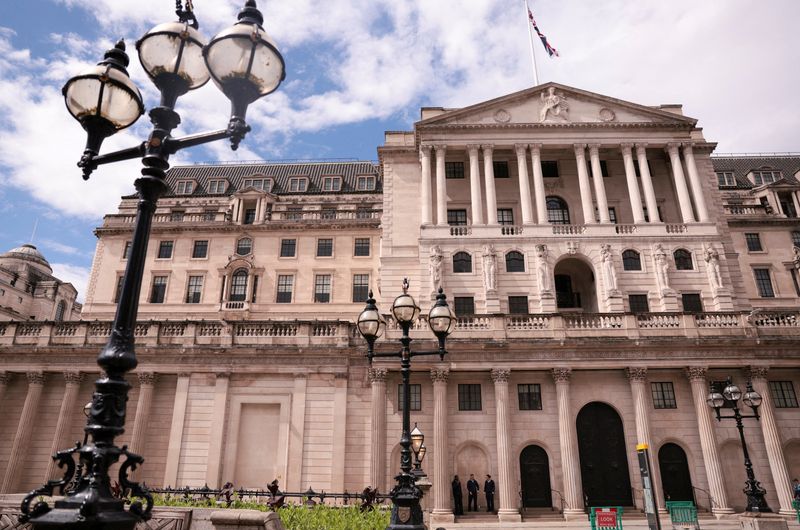By Mike Dolan
LONDON (Reuters) -The Bank of England may sit out this month's interest rate cutting bonanza, but Thursday's meeting will still be meaningful, as it will throw a spotlight on the BoE's delicate dance with the UK Treasury.
The BoE's hesitation in delivering its second rate cut of the year is partly due to questions about how it will incorporate next month's budget statement from the new UK Labour government into its thinking on inflation and growth over the next year.
The UK government's murmuring thus far indicate that it's going to put forward a tight budget. This should help the BoE in its efforts to cover the sticky "last mile" of disinflation in services and wages, and it may well clear the decks for more rapid monetary easing moving ahead.
And the BoE may end up returning the favour, whether it intends to or not.
The Bank is due to announce next year's target for reducing its pandemic-bloated balance sheet of gilts. This "quantitative tightening" (QT) plan is technically separate from its rate policy, and a programme it likely hopes it can pass off without much attention or disruption.
But the BoE's QT announcement may be hard to shuffle away quietly.
That's partly because it has been one of the few major central banks to engage in active sales of bonds to downsize its balance sheet. In other words, it's not just allowing the debt to mature and roll off organically like the Federal Reserve or European Central Bank.
And this time around, there's a twist in the calculation - one that should affect both BoE activity in the bond market over the year ahead and the new Labour government's fiscal math for its keenly-awaited and controversial first budget statement.
As it stands, the overwhelming market consensus is the BoE will simply recycle last year's goal of reducing the balance sheet by 100 billion pounds ($131.59 billion) over the coming 12 months. So far, so simple - and in keeping with the BoE's stated aim to be predictable.
The issue, however, is that next year will feature a heavier schedule of maturing debt. So a 100 billion-pound targeted runoff would mean active gilt sales would be 75% lower compared to the totals recorded over the past 12 months.
And analysts think that the roughly 13 billion pounds of gilt sales required could be completed by year-end, removing the BoE as a seller completely for most of next year.
That's likely to be a boon for bond investors - but also for the Chancellor of the Exchequer.
GILT FREE?
A quirk in the QT process is that it crystallises valuation losses incurred on the bonds between the period in which the BoE bought them, when policy interest rates were near zero, and now, when rates are 5%. The price of those bonds will have plummeted in the meantime.
Given that the Treasury is effectively on the hook for BoE losses, QT crimps the government's fiscal space and scope.
True, these calculation may merely be shifting the periods in which balance sheet losses are booked, but this added wiggle room could still be a big help for an incoming government under pressure to fill what it claims to be an inherited fiscal hole of some 20 billion pounds.
To be sure, not everyone thinks the BoE will stick to the 100 billion QT figure for the year ahead - so the "gift" of fiscal wiggle room may not materialise.
Deutsche Bank's UK economist Sanjay Raja thinks the BOE may want to retain a "more consistent footprint" of gilt sales. So he sees it lifting the overall QT target to ensure quarterly gilt sales of 5 billion to 10 billion pounds - not least because active sales will have to rise again the following year.
The BoE's estimate of its balance sheet's "steady state" - that is, the size it'll be comfortable with over the long term -implies another 230 billion-pound reduction at least. That suggests the QT process has at least another couple of years to run.
Yet, the question of whether UK finance minister Rachel Reeves will use the Treasury's BoE exposure to game its own self-imposed fiscal rules is certainly a live one.
There's much speculation about whether Reeves will change the definition of "public sector net debt" that it uses in its five-year debt reduction pledge by excluding BoE exposure, unlike the previous government.
The independent Institute for Fiscal Studies last month estimated that based on the last budget, such a move could open as much 16 billion pounds of "fiscal headroom" for the government. The institute also noted this move could be justified if used for investment spending and would be tempting as it involves changes "few people understand or care about".
But even so, the think tank said shifting goalposts to make the figures add up seemed hard to justify.
"If the government wants to borrow more and spend more, it would ideally make the case for doing so on its own terms, rather than hide behind fiscal jiggery-pokery," it added.
Whether the BoE QT plays ball on Thursday remains to be seen.

The opinions expressed here are those of the author, a columnist for Reuters
($1 = 0.7599 pounds)
(By Mike Dolan; Editing by Jamie Freed)